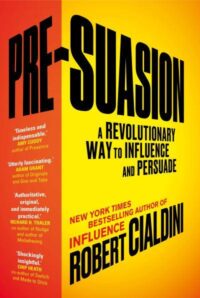Reading Notes for:


ARE YOU ADVENTUROUS ENOUGH TO CONSIDER A REVOLUTIONARY MODEL OF INFLUENCE?
According to this nontraditional—channeled attention — approach, to get desired action it’s not necessary to alter a person’s beliefs or attitudes or experiences. It’s not necessary to alter anything at all except what’s prominent in that person’s mind at the moment of decision.
In a companion study, the two scientists found that it was similarly possible to increase willingness. As an opener, they asked people if they considered themselves adventurous .
Reluctantli—only 33 percent volunteered their contact information. The other subjects were asked initially, “Do you consider yourself to be somebody who is adventurous and likes to try new things?” Almost all said yes—following which, 75.7 percent gave their email addresses.
Two features of these findings strike me as remarkable. First, of the subjects who were asked if they counted themselves adventurous, 97 percent (seventy out of seventy-two) responded affirmatively. The idea that nearly everybody qualifies as an adventurous type is ludicrous.
Moreover, the narrowed perspective, though temporary, is anything but inconsequential. For a persuasively privileged moment, it renders these individuals highly vulnerable to aligned requests—as
The ruthlessness of channeled attention, which not only promotes the now-focal aspect of the situation but also suppresses all competing aspects of it—even critically important ones.
We are said to “pay” attention, which plainly implies that the process extracts a cost. Research on cognitive functioning shows us the form of the fee: when attention is paid to something, the price is attention lost to something else. Indeed, because the human mind appears able to hold only one thing in conscious awareness at a time, the toll is a momentary loss of focused attention to everything else.
